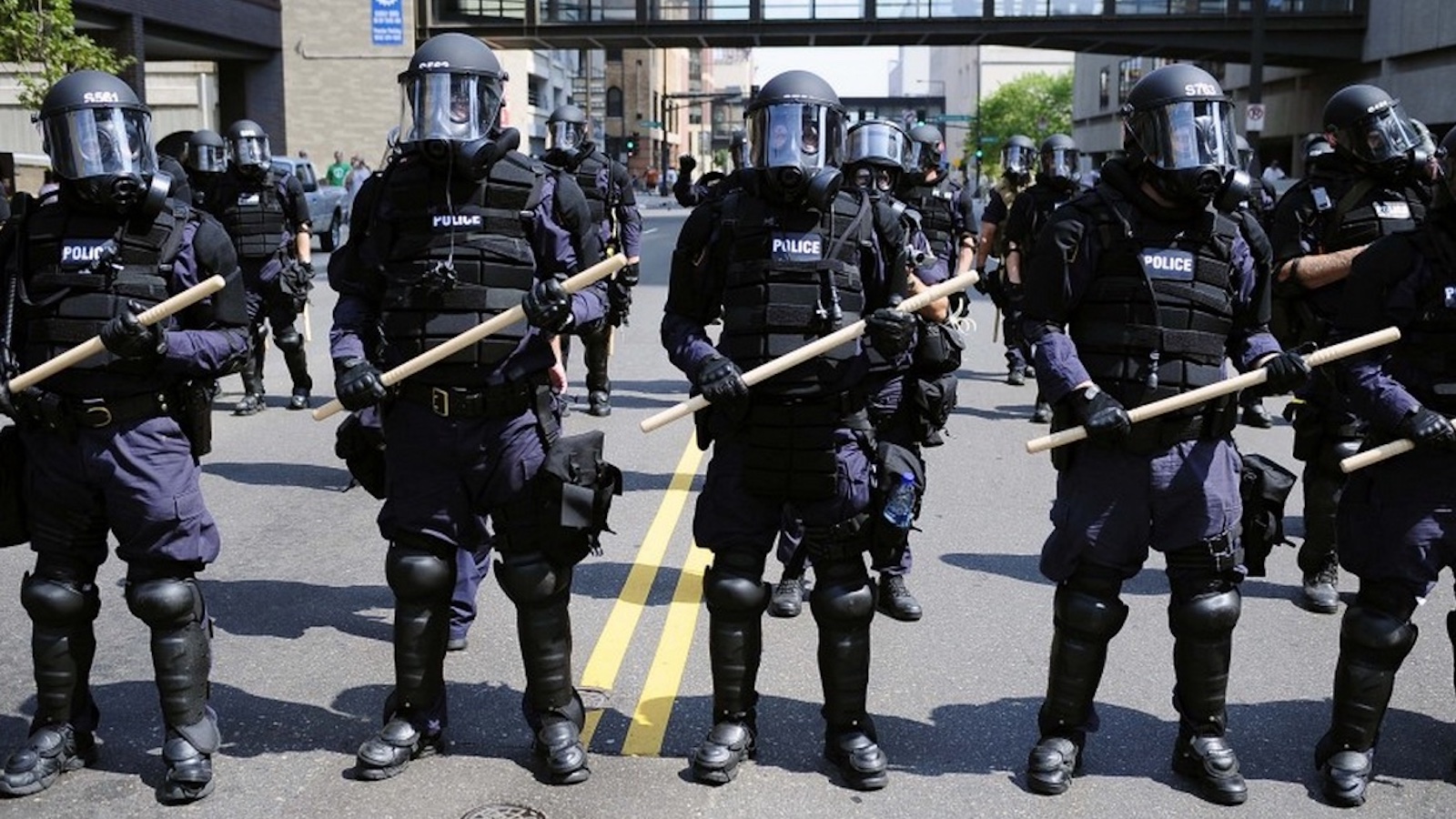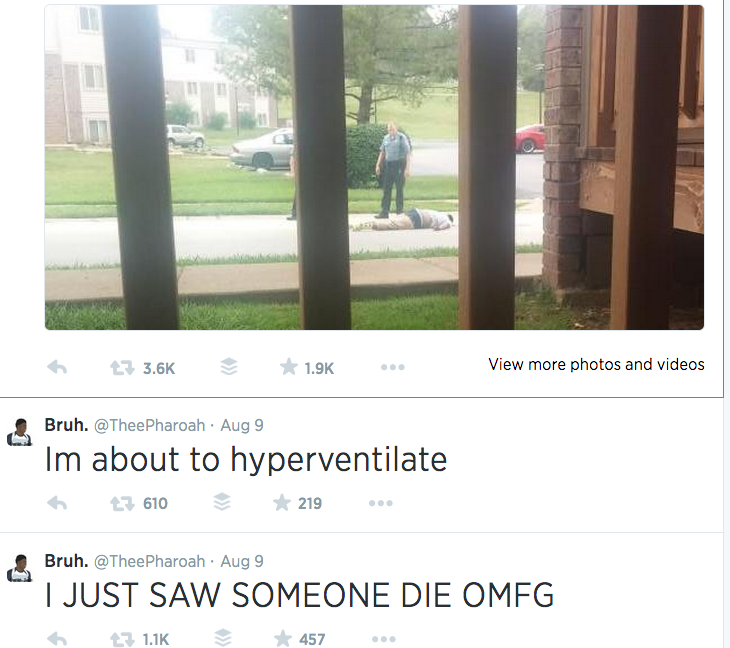
The American War Zone
It’s strange how something ominously frightening — the centralized and militarized police state in the U.S. — can grow for 15 years at least and yet not enter into public debate. The upheaval in Ferguson, Missouri, has changed that. This is all to the good. It means that after the unchecked rise of the police state, the tide might finally be turning the other way.
Why the new consciousness? It’s not the events themselves. Killings, riots, racial tensions, military-style crackdowns have been with us since the 1960s, and, actually, date back to the 19th century protests against the draft in the Civil War. Probably we can even date this stuff back further to the Whiskey Rebellion.
What’s different? The cops are scarier and more destructive than ever before. They are omnipresent. And thanks to the democratization of technology, we know more about them than we used to and hence we are in a position to judge.
This is why the war tactics, gear, weaponry, and scorched-earth belligerence of the local police have become such an issue. It’s affected all of our lives, and every day.
Just two days ago, I was at a stoplight at a low-traffic intersection in Atlanta, Georgia. I was changing the setting on my GPS so I could find my way. A cop banged on my window and started screaming at me and threatening me. It was a completely disproportionate, scary, fantastically uncivilized, and pointless. It left me rattled and feeling just a bit dehumanized, even if I was in the wrong. I asked him for directions. He dismissed me bruskly and walked off. It took 30 minutes for my heart to stop racing.
A ex-cop told me last year that it is a well-known fact that any driver anywhere can be followed for one block before some petty violation reveals itself. Once a driver is stopped, it’s all over. You can be heavily taxed in the form of a ticket. If you misbehave even slightly, with an eye roll or anything that gets on his or her nerves, you can find yourself in a cage within a matter of minutes.
That a U.S. Senator from the Republican Party has taken note and spoken is a huge political harbinger. Writes Senator Rand Paul in Time:
Washington has incentivized the militarization of local police precincts by using federal dollars to help municipal governments build what are essentially small armies—where police departments compete to acquire military gear that goes far beyond what most of Americans think of as law enforcement…
When you couple this militarization of law enforcement with an erosion of civil liberties and due process that allows the police to become judge and jury—national security letters, no-knock searches, broad general warrants, pre-conviction forfeiture—we begin to have a very serious problem on our hands….
Given these developments, it is almost impossible for many Americans not to feel like their government is targeting them. Given the racial disparities in our criminal justice system, it is impossible for African-Americans not to feel like their government is particularly targeting them.
 How much has technology contributed to the new awareness? The shooting death in Ferguson was tweeted with an image minutes after it happened. Soon after, Twitter went wild. As the protests and the crackdown began, every smartphone in town recorded the events and broadcast them to the world. The power of coercion has been matched by the power of information.
How much has technology contributed to the new awareness? The shooting death in Ferguson was tweeted with an image minutes after it happened. Soon after, Twitter went wild. As the protests and the crackdown began, every smartphone in town recorded the events and broadcast them to the world. The power of coercion has been matched by the power of information.
No more killing in secret. No more abuse that is regarded as mere rumor and dismissed. No more coverups of official criminality. It’s all in the open now. You don’t have to have an intense political consciousness to see that this is not the way things are supposed to happen in a free and civilized society, and to see that the police are not keeping order here but rather inflaming and escalating.
In the past, it was common for people who considered themselves to be conservative politically to claim to support freedom and free enterprise, to be against overweening government, but still be huge supporters of the cops. The police were the thin blue line, an essential element of the “minimal state.” It was only the far left that screamed about police abuse.
But it turns out that government uses the same means and has the same effects in every area of life. It is violent, voracious, parasitical, invasive of property and personal rights. It grows without check, never satisfied with its current level of resources or power. The same government that taxes and regulates the economy also institutes the curfews and releases the tear gas to control the population. The same government that attacks free enterprise also arrests the dope smoker, struts in riot gear, runs the courts, and starts the wars.
There is no such thing as a government that only does what you want it to do. Power once tolerated invades the whole of life.
In some way, it’s rather sad that police rampages are only becoming an issue now that they are profoundly affecting the white bourgeoisie.
Black American activists have been shouting about police abuse for many decades. It was for this reason that libertarian activists in the 1960s — Murray Rothbard, Karl Hess, Leonard Liggio and others — regarded black protests against the police as a sign of hope. What they hadn’t anticipated was just how race-focussed the police were, and how the political damaged could be contained so long as the powerless were the main victims.
My eyes were only opened to the way the criminal justice system has disproportionately abused racial minorities when I spent a day in criminal court. I saw person after person — almost entirely racial minorities — crawl before the judge for petty infractions and find their lives utterly wrecked with the small hit of a gavel on a desk. More fines, no more drivers license, off to jail with you. It was an incredible thing to watch them all chewed through like food for dogs.
Watching that scene made me feel as if I had been somehow protected my whole life from what a certain community knows very well. Today, we all know it, and there is no more keeping this issue as the exclusive concern of left radicals.
Racism may not be the driving motivation behind police work today but it is the effect, and the effect entrenches mindsets and informal policies. Blacks are the target of police because government-controlled systems of policing and monopolistic “justice” services need bodies to justify their budgets and power. The path of least resistance is to target communities that reliably lack political pull and economic power to counter abuse of their rights. They are targeted…as a community. That black people think they are singled out is not paranoia. This is not obsession. This is an impression gained from the experience of the reality of everyday life.
But power once gained at the expense of one sector of society eventually spills over to everyone, and that’s what’s happening today.
Consider even the way the police are shown today in popular culture. The other day, I watch Amazing Spider- Man, part 1 of the new series starring Andrew Garfield. It was far better than any previous version I had seen. Peter Parker is not pathetic and put upon but rather thrilled at his powers, and happy to use them to make the world a better place.
In previous versions, he was heckled and harassed by a newspaper editor who thought he was a menace to the city. But in this version, that role is played by the police and the chief of police in particular. Why do they regard Spider-Man as a problem? Because he was doing a better job at catching thieves and cleaning up the city than the police were doing.
So, of course, the police turn their guns on him. What does this imply? It suggests all the things we now know but did not used to know about the nature of police forces. Their primary interest is not in the public but in themselves, their own safety, their own unlimited power, their own budgets. Anything that makes them look less than wonderful and powerful must be crushed.
This is a serious twist in the Spider-Man story, and one that fits exactly with our times. The police are shown throughout most of the movie. They wear riot gear. They carry military weapons and machine guns. Tear gas is normal. You can’t see their faces through the helmets. They drive tank-like vehicles. Their presence makes the urban environment look like a war zone.
Now, if this movie had been made 20 years ago, the reaction would have been: this is completely unrealistic. This is not how cops look and not how cops behave. Or perhaps this is some dystopian plot. No more. The most chilling feature of this movie is that all of these scenes are completely realistic. They picture the reality as we currently know it.
The good news is that we now know about it. We can thank technology for this, and the app economy that has helped restore the balance in favor of the citizen, putting the power of information in our hands. In the end, knowledge is more powerful than all the weapons in the world combined.
Free the People publishes opinion-based articles from contributing writers. The opinions and ideas expressed do not always reflect the opinions and ideas that Free the People endorses. We believe in free speech, and in providing a platform for open dialogue. Feel free to leave a comment.




Toni Sopocko
Let’s not forget the BLM and Cliven Bundy, only 4 months ago, though so much has happened since then, it seems a year at least. If not for the ‘new media’ we’d never have known about that, either. Nor would anyone have seen the militaristic tactics of a ‘land management’ agency. Interesting stuff about all that in this quarter’s “Range” magazine.
Caitlin Long
Brilliant Jeffrey!
Audrey C
As a secular Buddhist, this one hit me hard. I try valiantly to have compassion for all beings, but the police – deluded and drunk with power – are making this very, very hard. All I can think about is that young man – terrified, hands up – being shot down like a dog. I know that we will likely never know exactly what happened that day – but hopefully, Michael Brown’s legacy will be demilitarized police.
Cathy Cuthbert
Jeff, it would be nice to put a caption about the photo. What is it, please?
David Montgomery
Cathy, looks like Anytown, USA. 😉